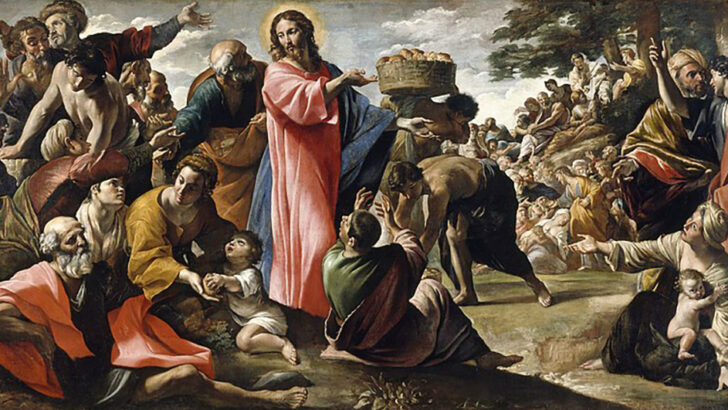The Sunday Gospel
2 Kgs 4:42-44
Ps 145:10-11, 15-16, 17-18
Eph 4:1-6
Jn 6:1-15
The celebration of a National Eucharistic Congress this year invites reflection on the gift and mystery of the Eucharist. We are reminded that each time we participate in the Mass we are connected to an unbroken tradition that traces back to the second century when the Eucharist was celebrated as early as the year A.D. 155.
Apologist
In the writings of the early Christian apologist, St Justin Martyr, we learn that Christians gathered to celebrate the Eucharist according to the order of the Mass, as it is celebrated today. After the word of God was proclaimed, the community was encouraged to live God’s word. Then, as Justin Martyr recounts, the presider took bread and wine, offered thanks to God in the name of the Father, and the Son and the Holy Spirit. Then after exchanging a greeting of peace, the faithful received the ‘eucharisted’ bread and wine as spiritual nourishment for the journey of Faith.
Food is a basic human need. To be healthy, our bodies need nourishing food in moderate amounts. We become unhealthy, weak and even sick with too little or too much food. A billion-dollar industry thrives with health food fads that quickly come and go. Yesterday’s food craze is eventually replaced with new and passing food trends.
In the same way that our bodies cannot survive without food in balanced portions, our spirits and souls cannot thrive without spiritual food. The human desire for love and peace, written on the heart by God the Creator, is akin to the pangs of physical hunger for food that nourishes and satisfies.
Hunger
Only God satisfies our spiritual hunger.
All four Gospels writers relate the miracle of Jesus multiplying a few loaves and pieces of fish to feed the crowds gathered on a mountain. This miracle stands at the heart of Jesus’ identity and mission. In Jesus, God became one of us, offering himself as nourishment for the journey of life. This divine gift of self-emptying love, symbolised by the multiplication of the loaves and fish, continues in every age of the Church in the gift of the Eucharist.
Jesus desires to meet our spiritual hunger at the table of God’s word and the sacrament of His Body and Blood”
In St John’s telling of the miracle of the multiplication of the loaves and fish, Jesus took the loaves, gave thanks and distributed the blessed bread and fish to the hungry crowd. Jesus’ action of taking and blessing bread, giving thanks to God, breaking and giving it to his disciples and followers, continues in our own day in the Eucharist. For Jesus desires to meet our spiritual hunger at the table of God’s word and the sacrament of His Body and Blood. On the cross Jesus completed his divine self-gift so that we could share in his divine life as friends of God.
Before this supreme gift and mystery of Faith, we are overcome with “Eucharistic amazement,” in the words of St John Paul II.
Journey
Just as our bodies need food, we need spiritual food for the journey of Faith. Like the disciples and the crowds who followed Jesus in the Gospels, we are each invited again and again to the spiritual nourishment of the Eucharist as we pray in Faith, “speak to me, Lord.”
Question: How does the presence of Jesus in the Eucharist nourish your spiritual life?
Jem Sullivan holds a doctorate in religious education and is an associate professor of catechetics in the School of Theology and Religious Studies at The Catholic University of America in Washington.


 Miracle of the Bread and Fish (17th Century), Giovanni Lanfranco. Courtesy of the National Gallery of Ireland
Miracle of the Bread and Fish (17th Century), Giovanni Lanfranco. Courtesy of the National Gallery of Ireland 